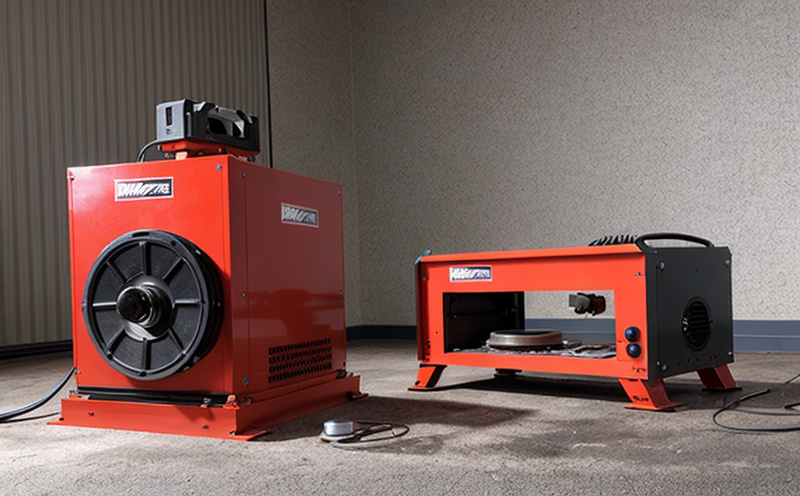ISO 2872 Impact Testing of Industrial Equipment
The ISO 2872 standard provides a comprehensive framework for impact testing industrial equipment, ensuring that the devices are capable of withstanding sudden mechanical impacts without failure. This test is crucial in industries where machinery and components experience harsh operating environments, such as mining, construction, and manufacturing.
Impact testing evaluates the resistance to sudden forces that can occur during normal operation or accidental events. The standard specifies methods for determining the energy absorbed by the specimen during impact, which helps engineers understand the equipment's durability under real-world conditions. This is particularly important when selecting materials and design configurations that ensure reliability and safety.
The test involves applying a controlled impact to a specified location on the sample, measuring the resulting deformation or damage, and comparing it against acceptance criteria defined in ISO 2872. The standard covers various types of impacts, including drop tests, hammer strikes, and pendulum impacts. It is applicable to a wide range of industrial equipment, from large machinery to small components.
For compliance officers, this test ensures that the equipment meets international safety standards. For R&D engineers, it provides valuable data on material properties and design optimization. Quality managers can use these results to improve production processes and ensure product consistency. Procurement teams benefit by selecting suppliers who adhere to such rigorous testing protocols.
The ISO 2872 standard is widely recognized for its precision and repeatability, making it a preferred choice for industries that demand reliability in their equipment. By adhering to this standard, manufacturers can enhance the robustness of their products, reduce maintenance costs, and increase customer satisfaction.
| Applied Standards | Description |
|---|---|
| ISO 2872-1:2015 | Impact testing of mechanical parts - Part 1: General principles and test methods. |
| ISO 2872-2:2015 | Impact testing of mechanical parts - Part 2: Impact tests with pendulum impact machines. |
The standard's detailed procedures ensure that the test results are consistent and comparable across different laboratories. This consistency is crucial for industries where regulatory compliance and quality assurance are paramount.
At Eurolab, we employ state-of-the-art equipment to conduct ISO 2872 impact tests. Our skilled technicians follow the standard's procedures meticulously, ensuring accurate results that meet international standards. Our laboratories adhere strictly to ISO 9001:2015 quality management system requirements, guaranteeing the highest level of accuracy and reliability in our testing services.
Our approach is not just about meeting specifications; it’s about exceeding expectations. By providing precise data on impact resistance, we help manufacturers make informed decisions that lead to safer and more durable products. This aligns with our mission to deliver excellence in every test we perform.
Applied Standards
| Applied Standards | Description |
|---|---|
| ISO 2872-1:2015 | Impact testing of mechanical parts - Part 1: General principles and test methods. |
| ISO 2872-2:2015 | Impact testing of mechanical parts - Part 2: Impact tests with pendulum impact machines. |
The standards referenced above provide the framework for conducting accurate and reproducible impact tests. They ensure that all aspects of the test, from setup to execution and reporting, are conducted in a standardized manner. This standardization is essential for industries where compliance with international regulations is critical.
Industry Applications
The ISO 2872 impact testing service finds application across various sectors, including automotive, aerospace, and manufacturing. In the automotive industry, this test helps ensure that components like engine mounts and suspension systems can withstand the jolts and impacts encountered during use. For aerospace manufacturers, it is essential for verifying that critical parts such as landing gears or engine casings are robust enough to handle the stresses of takeoff and landing.
In manufacturing, this service is vital for evaluating the durability of tools and machinery used in production lines. By subjecting these components to simulated impact conditions, manufacturers can identify potential weaknesses before they lead to operational failures. This proactive approach not only enhances product reliability but also reduces downtime and maintenance costs.
Eurolab Advantages
At Eurolab, we pride ourselves on delivering exceptional quality in every test we perform. Our ISO 2872 impact testing service offers several advantages that set us apart:
- Expertise and Experience: Our team of certified technicians has extensive experience in conducting these tests according to the latest standards.
- State-of-the-Art Equipment: We use cutting-edge equipment that ensures precise and accurate test results.
- Comprehensive Reporting: Our reports provide detailed insights into the impact resistance of your specimens, helping you make informed decisions.
- Strict Compliance: Eurolab adheres strictly to ISO 9001:2015 quality management system requirements, ensuring reliability and accuracy in all tests.
We take pride in our commitment to excellence. Our goal is not only to meet but to exceed your expectations by providing high-quality testing services that are both reliable and reproducible.





